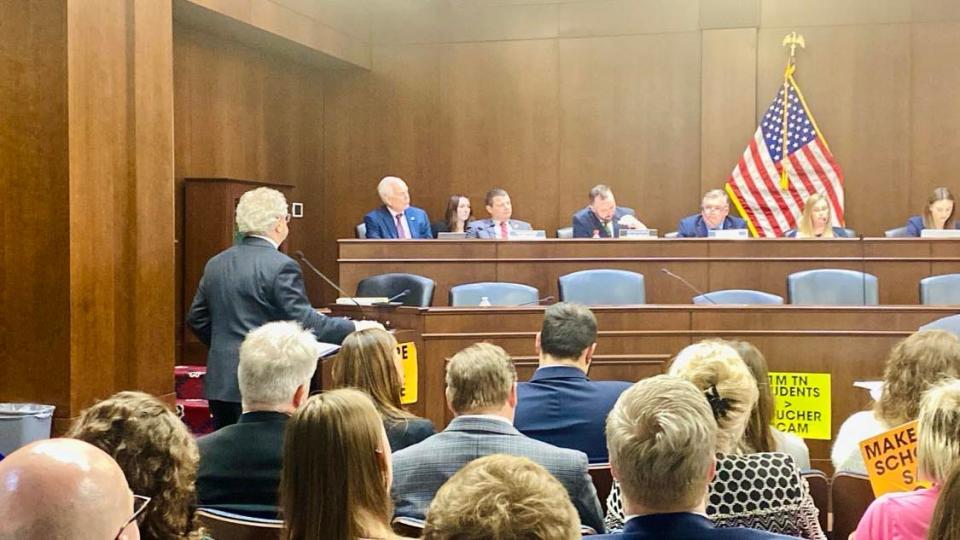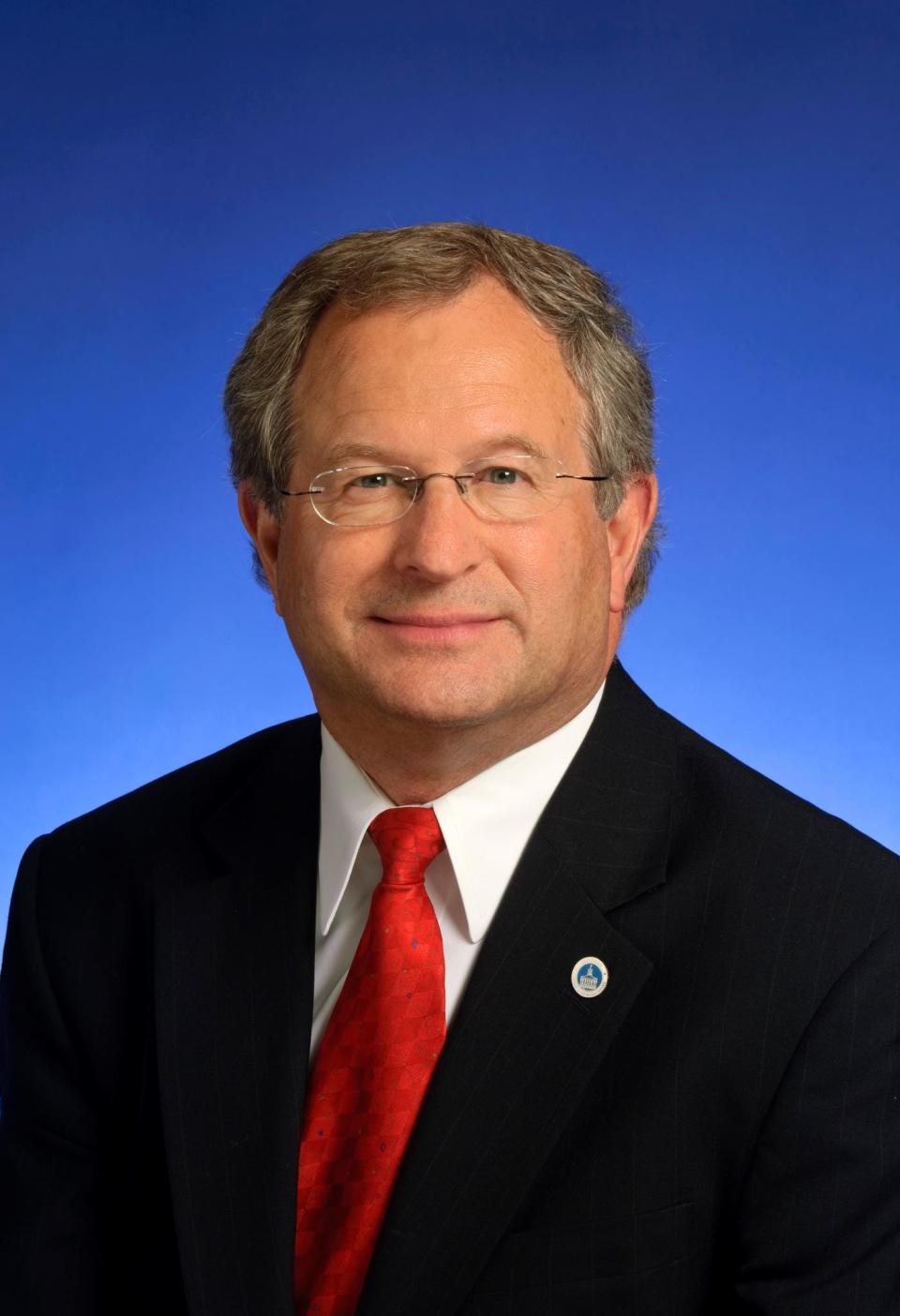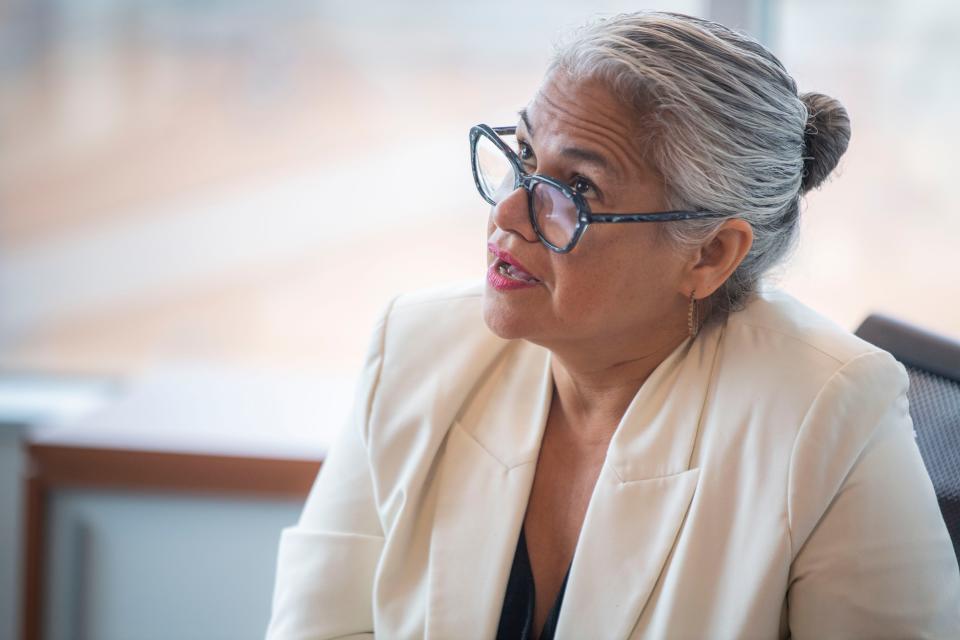Sweeping school voucher, public education overhaul in Tennessee passes first House hurdle
After less than two hours of presentation and debate, a statewide universal school choice proposal that includes sweeping changes to Tennessee’s public school system cleared its first House committee hurdle on Tuesday evening.
Members of the House K-12 Education Subcommittee gave first approval to the bill less than 36 hours after a 39-page omnibus amendment to Gov. Bill Lee’s school choice proposal became public.
In addition to establishing a program to provide 20,000 state-funded vouchers for students to attend private schools, provided they take certain tests, the wide-ranging amendment filed Monday would overhaul Tennessee's standardized testing requirements for public school students, make sweeping changes to teacher and principal accountability procedures, and shut down the state’s Achievement School District by 2026.
Despite testimony from Education Commissioner Lizzette Reynolds in support of the bill, there was little discussion of many of the details on Monday, such as changes to teacher and principal performance evaluations, changes to state testing requirements and no mention of the Achievement School District.
Bill sponsor Rep. Mark White, R-Memphis, who chairs the full House education committee, was limited under a new House rule to just 5 minutes for his initial presentation of the 39-page proposal. He offered more details during questioning.

“The primary reason we’re here is that we are continuing to offer our parents across the state of Tennessee choice when and where they need it,” White said. “Giving parents a choice in their child’s education – all across their child’s growing up – is most important.”
Several members on the committee expressed concern that they had not had sufficient time to review the legislation — having received it late Monday, after the committee’s amendment filing deadline had passed.
“I need to vet this,” Rep. Sam McKenzie, D-Knoxville, told the committee. “We got this amendment dropped on us.”
Two hours of presentation, testimony and debate unfolded in a crowded committee room. Spectators held signs with messages like “public funds for public schools,” and “1M TN Students > voucher scam.” One woman sat strategically behind the podium and scribbled messages to lawmakers on a makeshift notebook held as a sign.
“...Or we could just fully fund public education?” one read.
“What happened to standards and accountability???” came another. “Just double standards!”
After extensive questions from McKenzie — the lone Democrat on the committee — and Rep. Todd Warner, R-Chapel Hill — a vocal opponent of state-funded vouchers — the committee approved the measure on a 6-2 vote. Rep. Bryan Richey, R-Maryville, and Rep. Chris Hurt, R-Crockett County, voted present.
'Ram it through'
Members of the committee said they had little time to digest the omnibus amendment before sitting down to discuss and vote. Richey, McKenzie, and Warner all said they’d received the bill text for the first time on Monday.
“I didn’t have any time to submit one amendment because the deadline was at 10 a.m., and I think this dropped at 9:59 and 59 seconds,” Richey said.
“In principle, I’m in favor of this, but there’s some bad language in this bill that needs to be cleaned up,” Richey said.
Warner requested the committee roll the bill one week so that members all would have a chance to read and draft proposed amendments to the sweeping legislation.
With only six or seven weeks of the legislative session to go before adjournment is anticipated, time is of the essence. The motion failed on a 6-4 vote.
"I had heard about the bill all the way back in October, when the governor's office came and sat down — I'd heard this is what we're looking at doing," Richey said. "Very little of what I had heard is actually even in this bill."
“It must be nice that we have three of the members that sit on this committee that got to actually sit down and figure out what's in here,” Richey said. “And because it's such a contentious bill moving forward, we even invited an additional member to come in and sit down and make sure we have the votes to ram it through.”
Speaker Pro Tem Pat Marsh, R-Fayetteville, who does not sit on the subcommittee, was present and voted – as the House rules allow both the speaker and speaker pro tem to sit on any committee.
'Strategic changes to public education'
During the hearing, White highlighted the goals of the legislation to lower the number of tests required in public schools in an effort to “return more hours to the classroom,” and save school districts a total of $200 million by increasing the state-paid share of teacher health plans.
“We have been listening and are trying to address the needs of our public schools,” White said.
White was joined in his presentation by Education Instruction Subcommittee Chair Scott Cepicky, R-Culleoka, who said the House version of the Education Freedom Scholarships proposal puts “caps on growth so that it grows sensibly.”

While a fiscal note for the legislation released on Tuesday found the total cost of the legislation to be nearly $400 million in the first year, Cepicky said only about $140 million of that total would go to the voucher program – the rest would fund “the strategic changes to public education,” to help equip public schools “to compete on a level playing field with private schools.”
Private schools participating in the Education Freedom Scholarships program would be required to have operated in the state for at least the last three years.
“We were adamant in the drafting of this bill that we not have pop-up schools,” White said.
Participants in the program would be subject to the same testing requirements as public school students (which the bill overhauls). Under the House proposal as amended, the private school testing data would be reported by grade band to “a third party buffer” before being ultimately reported to the state Department of Education.
Debate tense out of the gate
From the beginning, debate on the subject of the bill was emphatic and tense.
“I don’t think anyone here is against school choice or parent choice or whatnot – I’m against the government paying for it,” Warner told members.
Warner said the state’s Constitutional requirement to operate a free system of public schools.
“Any school that accepts public funding is — without doubt — a public school,” Warner said, prompting murmurs and claps of assent from the audience. Warner then asked White if he considered any private school that accepted public funds through the program a public school.
“Absolutely not,” White replied.
McKenzie and Hurt both noted lackluster achievement results among participants in the state’s current school choice program, known as Education Savings Accounts.
“I struggle with expanding the program in anticipation,” Hurt told the committee.
Cepicky argued that students coming out of a failing public school are already “so far behind.”
“That academic rigor would be new to them. It might set them back a little bit until they could get up to speed,” Cepicky said. “What we’re really looking forward to is the second year of the voucher program. … We’re going to see those educational outcomes take off.”
“One of our number one complaints from our teachers in the public school system is that we continue to evaluate, such as, a sixth-grade teacher on the performance of their students. Their No. 1 complaint is ‘why are you holding me accountable for my sixth-grade students when three-quarters of the classroom is still reading on a third-grade level?’”
Later, during her testimony Reynolds, the education commissioner, noted that only 53% of current voucher participants ever attended a Tennessee public school. Of those, the vast majority (36.5%) of participants were grandfathered in as they were eligible for the program before lawsuits challenging its constitutionality were filed, another 15.8% started kindergarten in a private school through the ESA program and a little over 1% had just moved in the state.
‘This proposal endangers public schools’
Three witnesses gave testimony to the committee on Monday. On behalf of the Tennessee Education Association, Drew Sutton asked members to oppose the measure, citing below-average achievement of students in the state’s existing school choice program, and saying that the proposed new program would create two separate systems of education in Tennessee.
“Public schools are the foundation of every community,” Sutton said. “This proposal endangers those public schools and the communities they serve.”
Clay County teacher Amy Briggs testified against the bill.
"School choice is a myth," she said. "It removes choice and freedom for parents."
Speaking on behalf of homeschoolers in the state, Tiffany Boyd said homeschoolers registered with Category 4 church-related umbrella schools are “adamantly opposed” to the bill.
“School choice does not create competition. There is no school choice when all of the choices are government-controlled,” Boyd said. “We do not want government money. We want the government out of our homes.”
In response, White noted that as amended, “homeschoolers are totally written out of this bill.”
Reynolds ‘encouraged by the spirit of the bill’
Reynolds testified in support of the governor’s bill, touting parent satisfaction with the state’s current voucher program, which is limited to Davidson, Shelby and Hamilton counties.
“It is a program that parents have chosen,” Reynolds said, noting that 99% of participating parents have said they are “very satisfied” with the program, and 91% said they are satisfied with their child’s academic growth.
Reynolds told members she is “very encouraged by the spirit of this bill” as it includes “provisions that are going to allow our families to have choices.” But she did not weigh in on specifics in the House version on changes to teacher accountability, testing requirements or the ASD.

Reynolds argued that private schools already have built-in accountability measures, such as “rigorous testing protocols and requirements.”
“At the end of the day, they are accountable to their families as to whether students are achieving,” Reynolds said. “If enough families are not satisfied with the program, the school can go out of business.”
In response to questions from Warner, Reynolds confirmed that students would be required to be U.S. citizens with a Social Security number to participate in the new school choice program.
“Is the state going to ask the question, ‘Are these children illegals’ or not?” Warner asked.
“They are eligible under this bill if they are a U.S. citizen,” she answered.
“Students who aren’t achieving, and who are not happy and whose parents are not happy with their education should have an opportunity to get an education elsewhere,” Reynolds said. “That’s what this bill is about.”
How committee members voted
Rep. Gino Bulso, R-Brentwood - Yes
Rep. Sam McKenzie, D-Knoxville - No
Rep. Bryan Richey, R-Maryville – Present
Rep. William Slater, R-Gallatin- Yes
Rep. Robert Stevens, R-Smyrna - Yes
Rep. Todd Warner, R-Chapel Hill - No
Rep. Chris Hurt, R-Crocket County- Present
Rep. Mark White, R-Germantown - Yes
Rep. Kirk Haston, R-Lobelville - Yes
Speaker Pro Tem Pat Marsh, R-Fayetteville - Yes
Vivian Jones covers state government and politics for The Tennessean. Reach her at vjones@tennessean.com.
This article originally appeared on Nashville Tennessean: School voucher, education overhaul in TN passes first House hurdle

